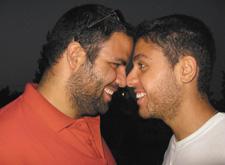When a Palestinian-Israeli lesbian discusses how she admitted to her Jewish lover that she was “fucking the occupation” after a drunken bout of sex turned intense and anger-fuelled, you know the documentary City of Borders is heading into dangerous territory.
The beginning of Yun Suh’s 66-minute film instills that simplistic pride many queers feel when presented with how our emerging transnational gay identity seems to be one of the few ways people can overcome the political and ethnic divisions that plague the planet.
But this fascinating, expertly crafted doc isn’t simple.
The film centres on what was the only queer bar in Jerusalem, Shushan, where gay and lesbian Jews and Arabs came together to dance, cruise and find respite from the world at war around them. Viewers literally follow a young gay Muslim, Boody, from the Palestinian side of the wall to the Israeli side as he and his friends make their way clandestinely to the bar.
The bar’s owner, Saar Netanel, an out city councillor, is a voice in the wilderness of Jerusalem’s intolerance. The homophobia displayed from city council chambers to the street is palpable. There’s striking footage from Jerusalem Pride events that, ironically, unify religious conservatives — Jewish, Muslim and Christian.
Another subject, Adam, a former Israeli soldier who was stabbed at a Pride event by a deranged Orthodox Jew, admits to fearing Arabs and his pride at being a settler.
It’s complicated.
With all its shifting loyalties and bewildering personal negotiations, City of Borders still leaves you marvelling at how queers connect and create community no matter what barrier or terror stand in their way. The film screens at Hot Docs at 3:45pm on Sun, May 3 and 9:30pm on May 4 at the Cumberland (159 Cumberland Ave).
Hot Docs screens two other films on creating alternate communities: one, Clubland, a local doc on Toronto’s Entertainment District, and the other, 69, on an infamous anarchist commune in Copenhagen.
While attempting to celebrate everything hip and sexy that nightclubs offer, Clubland confirms everything queers hate about what’s dismissively known as the “straight ghetto,” the eight downtown blocks zoned by the city as home to 85 or so straight nightclubs (Circa’s fluctuating queer bona fides notwithstanding) that disgorge up to 60,000 partiers onto the street after last call. The footage of bloody mayhem and charging police is sickening.
Despite intriguing commentary from club owners Charles Khabouth and Peter Gatien, Eric Geringas’ doc presents a rather simplistic scenario: free-lovin’ partiers, party promoters and club owners who create community, buzz and wealth on one side; sad-sack residents, politicians and greedy condo developers who want to shut the party down on the other. The 44-mintue doc makes no attempt to explore other urban planning options that could satisfy both sides. And it’s got a strange, ambiguous stance on the drunk and violent 905ers. As one dude says: “Any time in any environment where alcohol is served there will be some sort of violence. And most of the violence pertains to — and guys will admit this after they’ve been fighting — girls.” Any time, any environment? Um, actually, no. Go to the gay clubs, go to Pride. Booze does not equal violence. Clubland screens 10pm on Fri, May 1 at the Royal (608 College St) and 6:30pm on May 10 at the Bloor (506 Bloor St).
Since 1982 Copenhagen’s Youth House was a self-ruled commune for punks, queers and pretty much anyone who didn’t fit. Nikolaj Viborg’s hourlong doc, 69, follows what happens when the city tries to shut the community down. It screens at 7:15pm on Tue, May 5 and 4:30pm on May 8 at Innis Town Hall (2 Sussex Ave).
Also look for the 1992 feature Forbidden Love: The Unashamed Stories of Lesbian Lives by Canadians Lynne Fernie and Aerlyn Weissman, a groundbreaking doc that’s as fresh and fascinating today as it was 17 years ago. Pulp fiction (literal and dramatized) and amazing archival footage form the backdrop to a winning group of lesbians reflecting on how they found themselves and each other through — and despite — the tangle of pop culture, gender constructs and homophobia in 1950s North America. Forbidden Love screens at 11:30am on Sat, May 2 at Isabel Bader (93 Charles St W) and 2pm on May 10 at Innis.


 Why you can trust Xtra
Why you can trust Xtra


